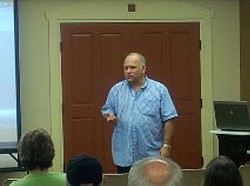Boardman library hosts event to help research military records
Neighbors | Tim Cleveland.Main library genealogical and local history librarian Tim Seman spoke at the Boardman library about how to access military records as part of a series of talks about genealogy.
By TIM CLEVELAND
Tim Seman, genealogical and local history librarian at the Main library, gave an hour-long presentation Nov. 11 at the Boardman library about how to access military records for genealogical purposes.
“Tonight’s program is one in a series of programs we have on genealogy,” he said. “It deals with military research, how to find records, whether they be personnel records, personal files or unit histories to get an understanding of what life was like for a relative and get a broader understanding of what the local and national history meant to these people and how they had an impact on it.”
Seman said there are different kinds of records that can be researched.
“I’ll be talking about what types of records we’ll be looking at,” he said. “There are personnel files, meaning the actual file of an individual soldier, what he or she did, where they were inducted, etc. On the other side are the unit histories, the histories of the regiments, the battalions, the units, where they fought and what engagements.
“A big part of the program will be identifying the sourced where one will find those records and then pulling it all together into a sort of genealogical narrative to understand that experience that those men and women had.”
Some of the records are in databases that the library subscribes to, some are on web sites, some are print sources and some are indexes to print sources. There are records on microfilm at the Main library branch. The library’s information services department can also direct people to where the sources are.
Seman said that while most researchers have only gone back as far as World War II, the records go back to the Revolutionary War. He said many Americans have ancestors who fought in the Revolutionary War.
“They tell part of the story – birth, marriage, death,” he said. “The other part is to understand the local history. What was it like to live in Youngstown in 1929, for example.”
Seman said researching his own family history began his interest in genealogy.
“Genealogy is a particular interest of mine,” he said. “Since I was very young, I’ve delved into family history. My uncle [Joseph Kozicki] fought and died in World War II and when I was very young, it caught my attention. I felt bad when I hit 20 because he never made it to that year.
“I began doing research and I uncovered facts and locations and I got my hands on all the military materials. But then I started thinking more broadly about what his experience actually was. Here’s a man I never knew and would never know but I’ve come to know him. That’s the purpose of genealogy.”
 43
43

